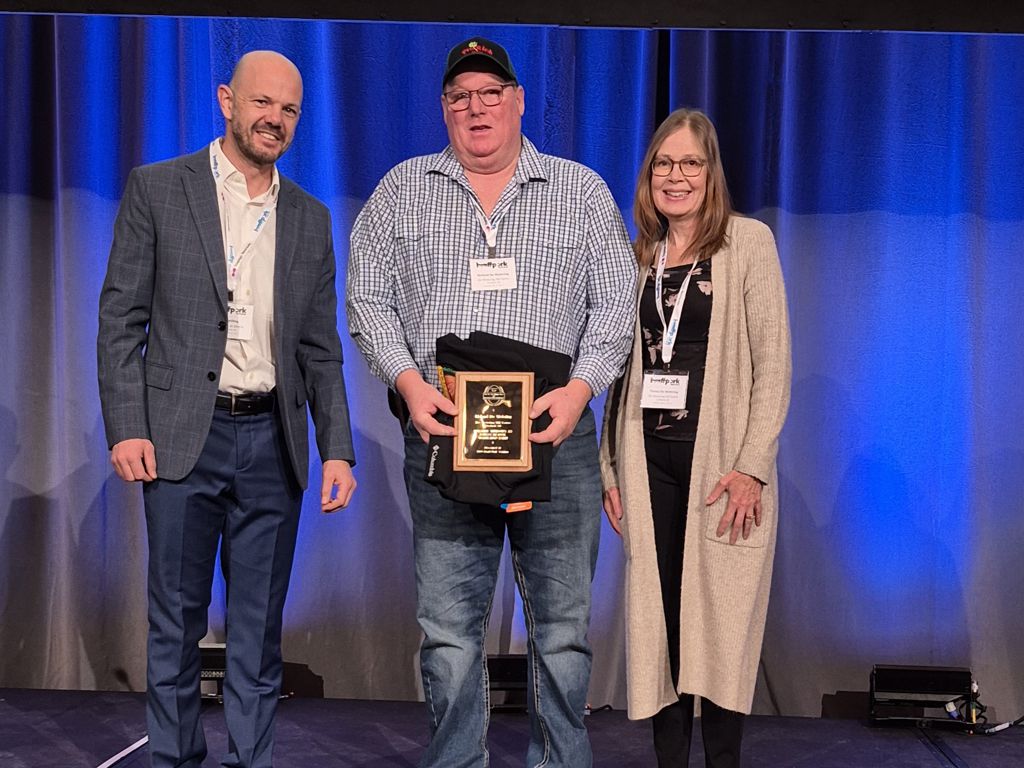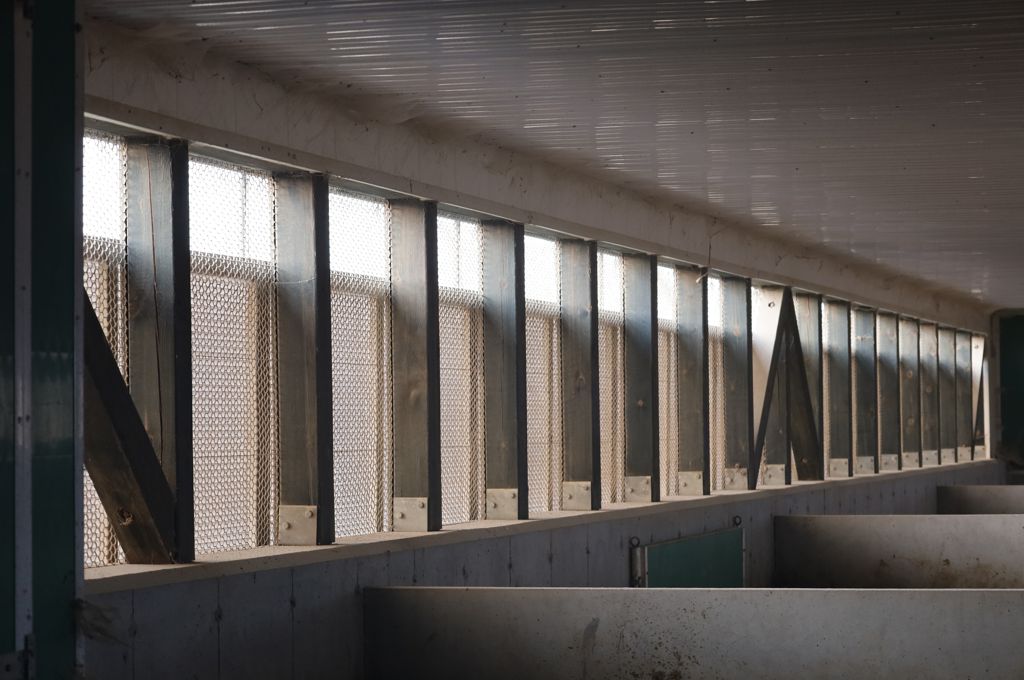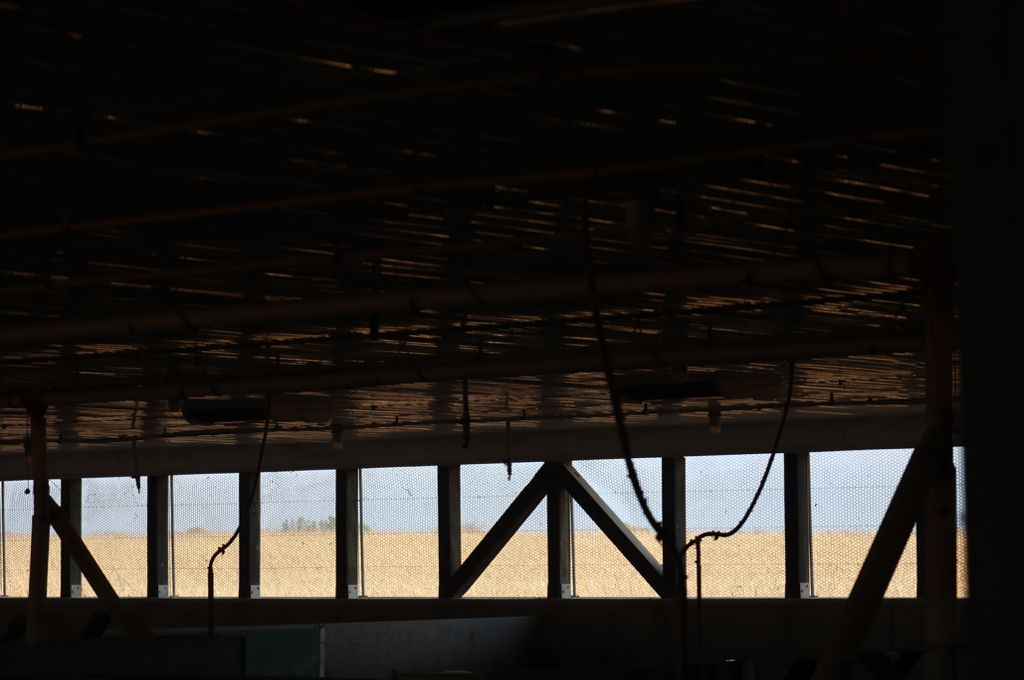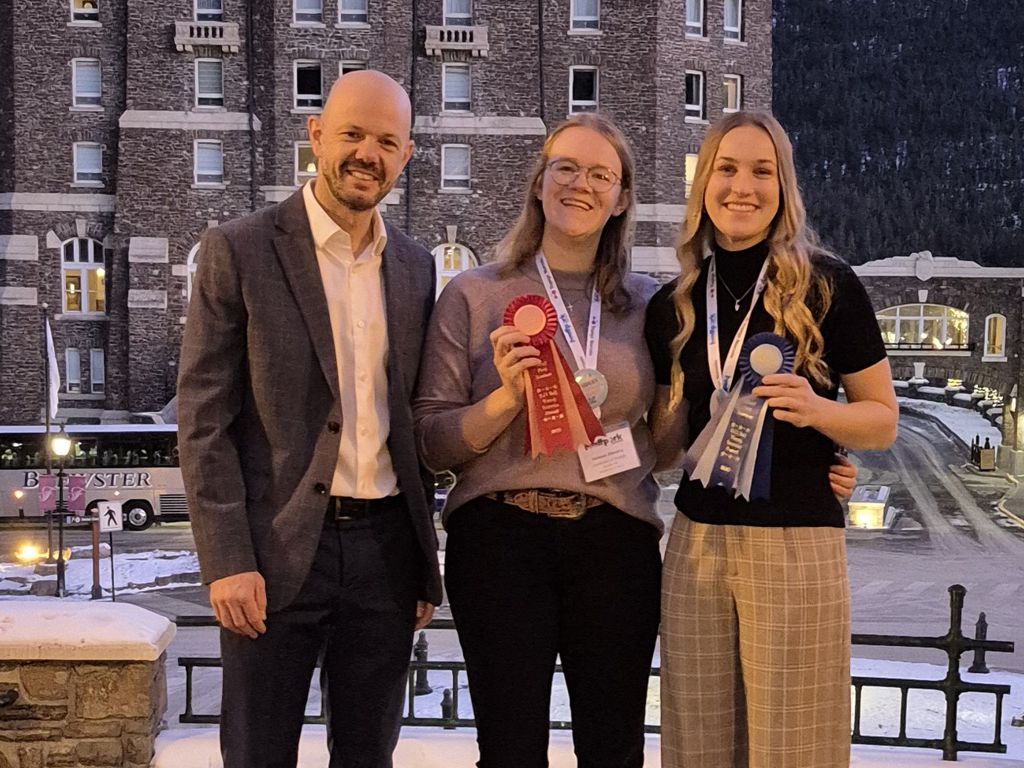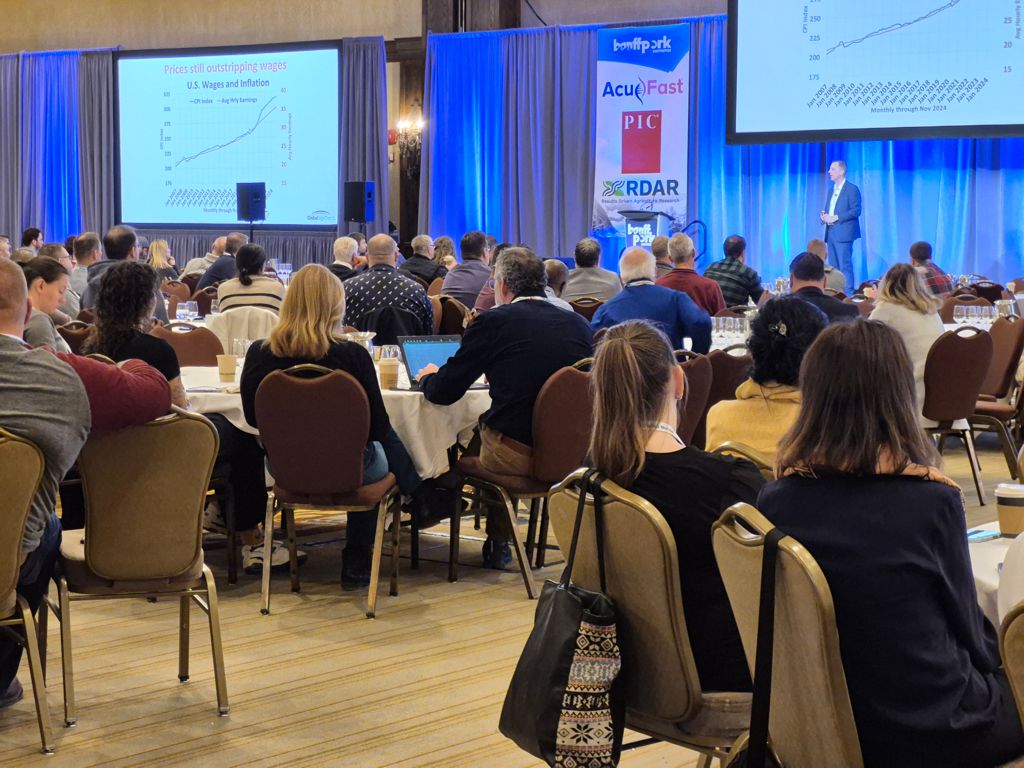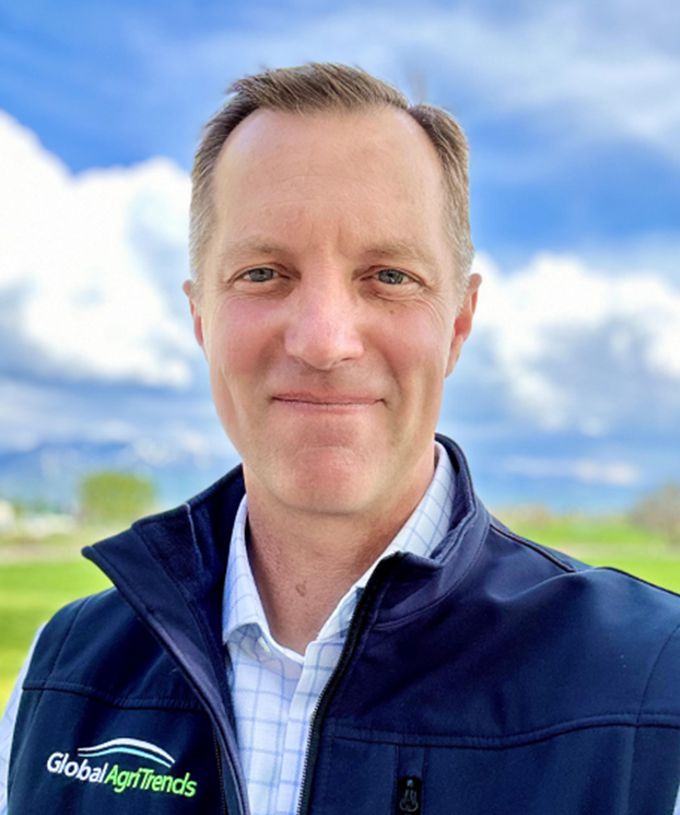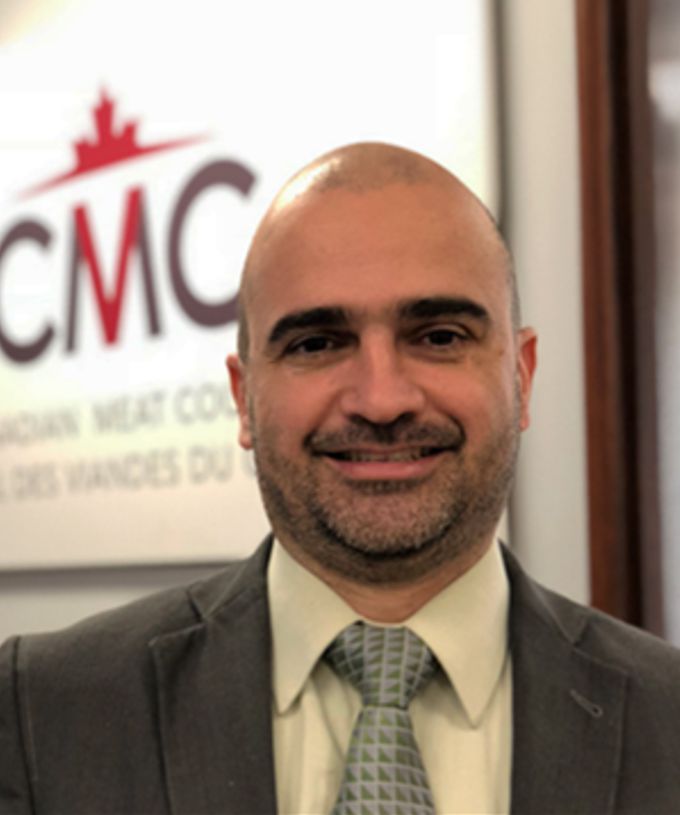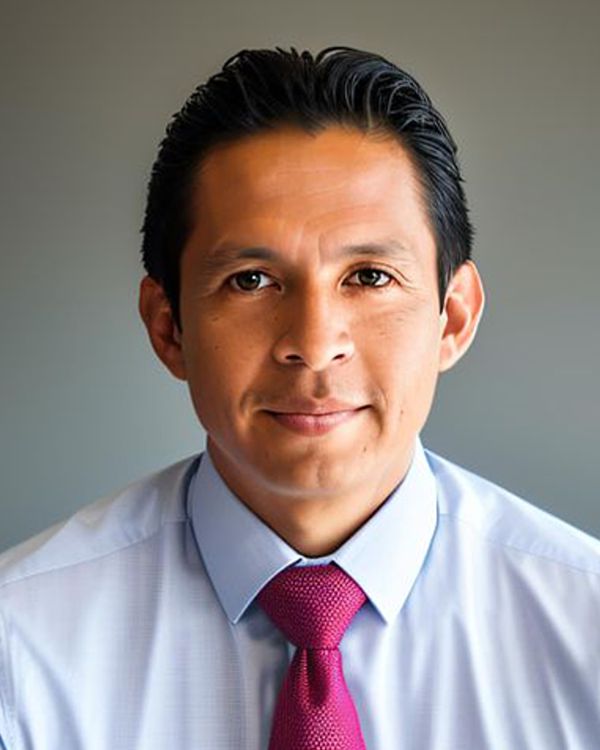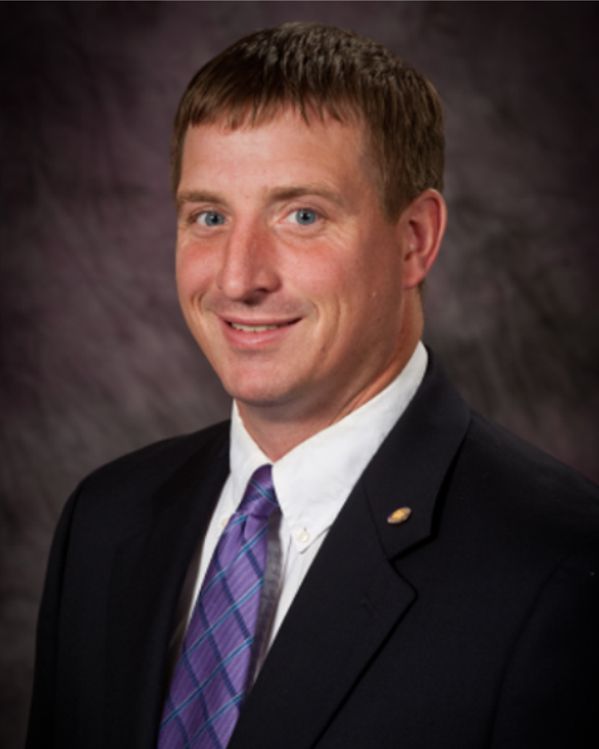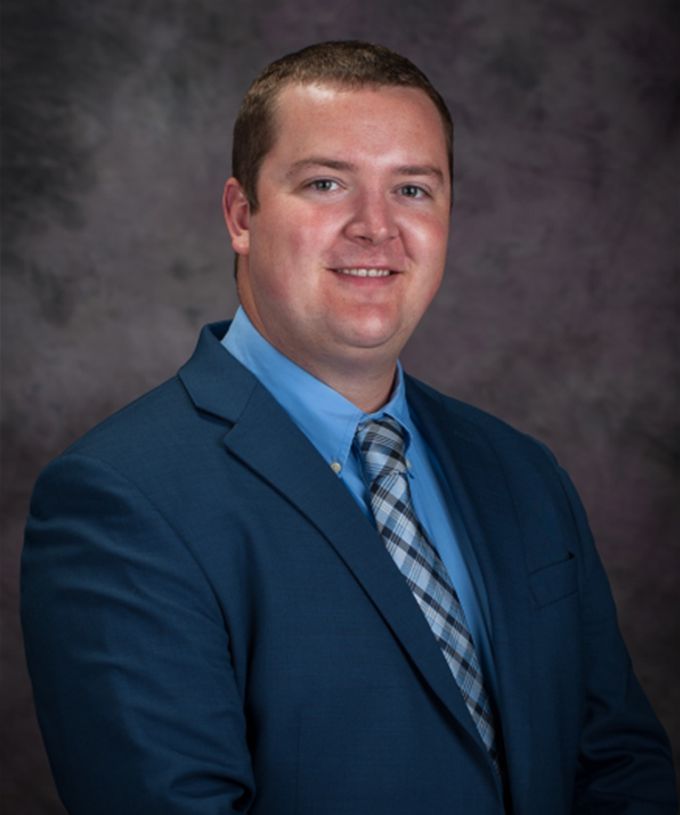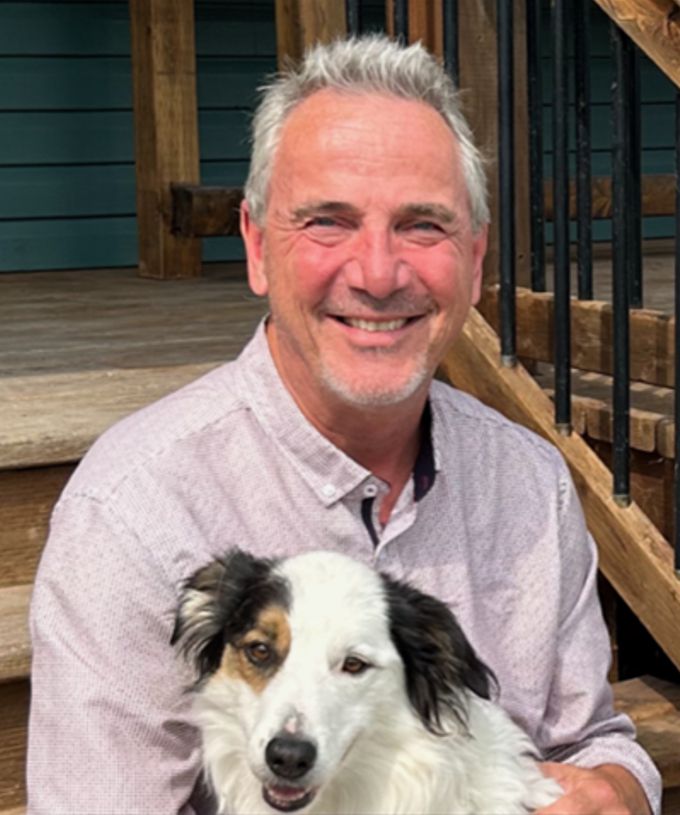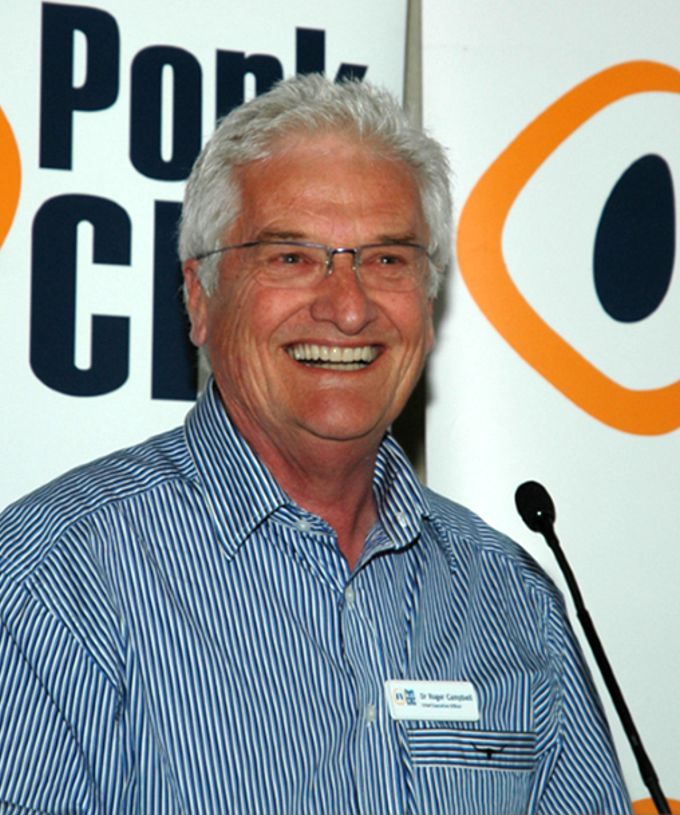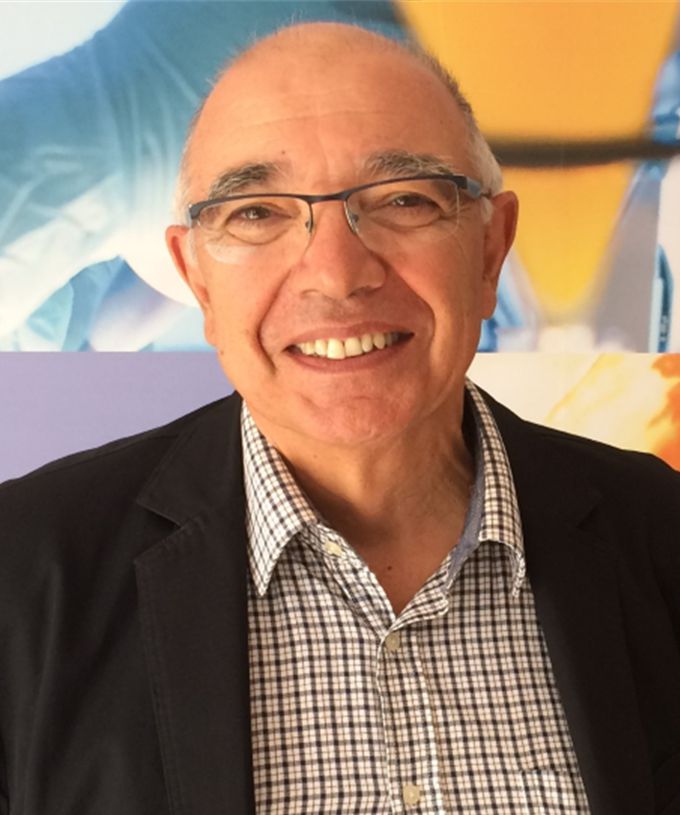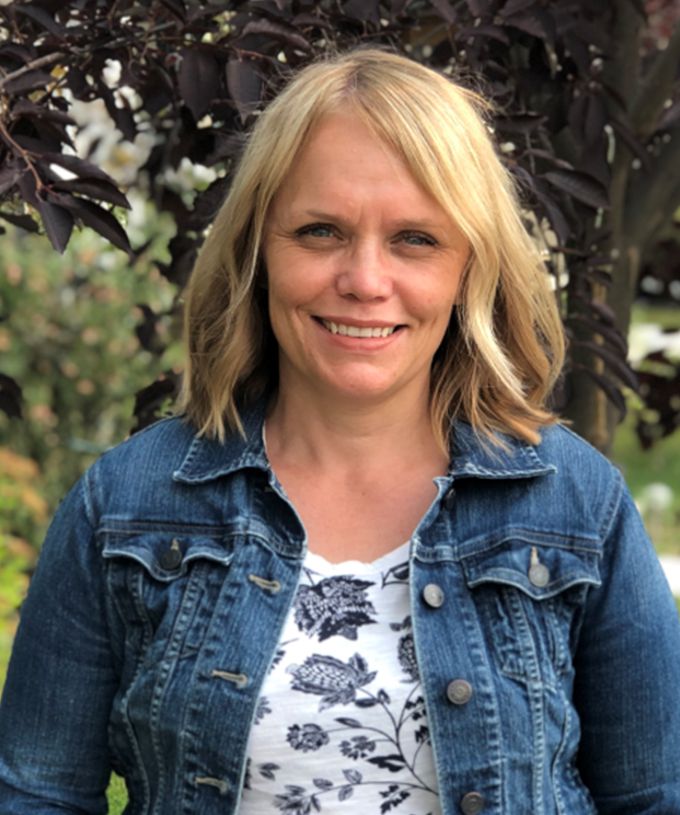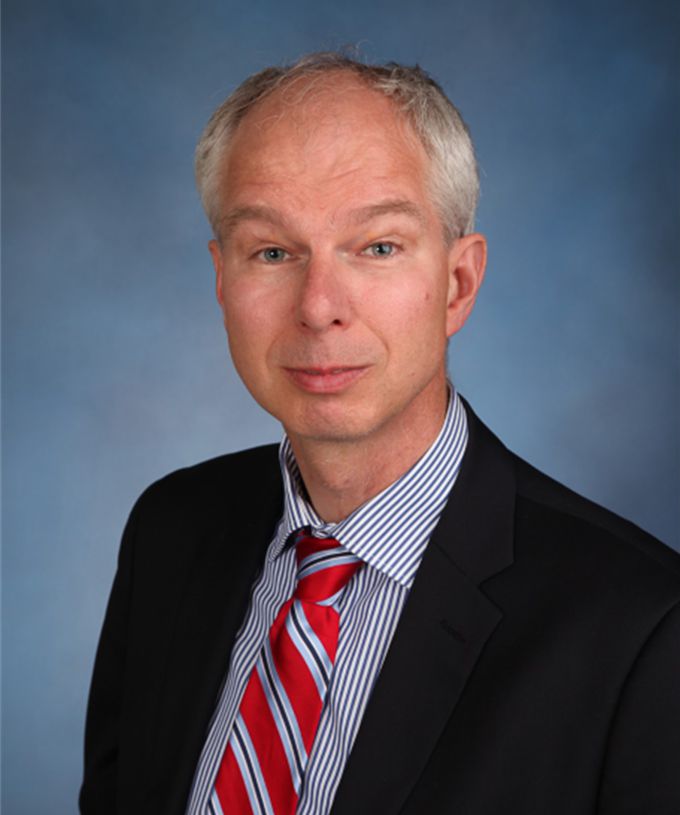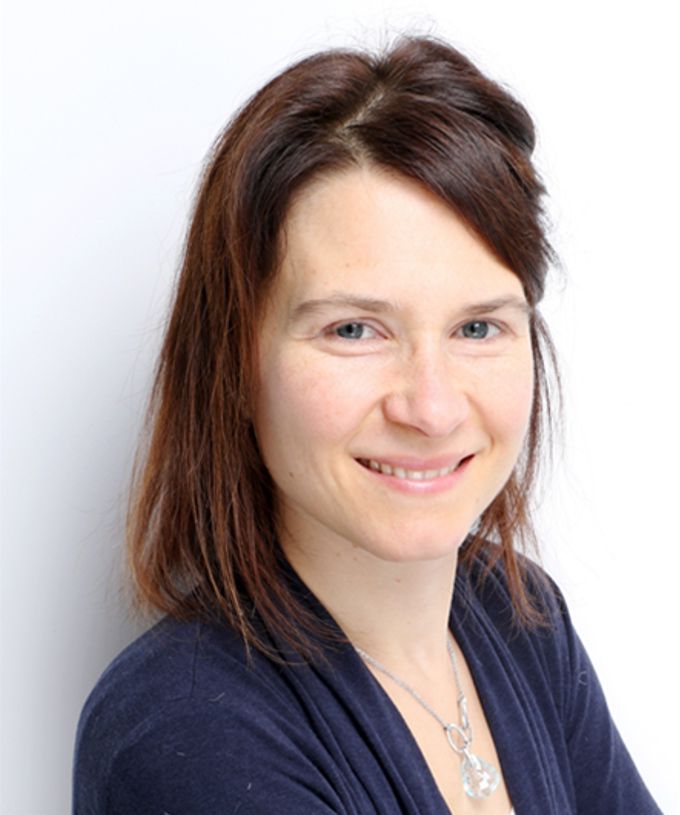Inside BPS Blog
News from the BPS Communications from inside the 2025 Banff Pork Seminar.
- Slow But Steady Wins the (Amazing) Race
- The "Hows" of Raising Sows
- Experts Share on Animal Care
- 2025 Aherne Prize Winner – Windows of Opportunity
- Student Scientists in a Class by Themselves
- Trade Talks
- In Sickness and in Health
- Labour Bridges: Build'em, Don't Burn'em
- Last minute tips for BPS delegates
- Day Two Plenary Gets the Crystal Ball Rolling
- BPS 2025: Let the Gains Begin
- Helping Pigs Survive and Thrive the Theme of Production Session 2
- Finish with a Flourish
- Nursery management: The young and the restless
- Sow Management: Top minds to boost your bottom line
- Feeding the need for healthy pigs
- Thank you to 2025 BPS Sponsors
- The people behind BPS 2025
Slow But Steady Wins the (Amazing) Race
Date posted: January 28, 2024
"I don't have all the answers. What I do have is a story. Since that day, I've found that people are very good at diminishing their own stories."
"That day" was April 6, 2018. The Humboldt Broncos team bus was struck by a semi-trailer that blew a stop sign. When the smoke cleared, 16 players and staff were dead, and another 13 injured.
Though he survived, Tyler Smith faced a long, slow road to physical recovery, saddled with a broken shoulder blade, punctured lung and two broken wrists. As it turned out, the path to regaining his mental health was even longer.
"For the entire summer after the crash, I had no desire to feel joy. I thought 'there are 16 families that forever have a missing seat at the dinner table. What gives me the right to laugh or smile?'" While his friends and family knew he was struggling, "it's hard to help people through change when they don't want to be helped".
By Tyler's own admission, he became emotionally numb and tried to deny his grief. That all changed when he attended the first Broncos game since the accident.
"They put up banners in honor of those who died, and when the banners dropped, so did I."
Falling to his knees, he cried for half an hour. It finally sank in that he needed to focus on his mental wellbeing. He has since made great progress by seeking counselling, sharing his story and becoming a mental health advocate. Oh yes, and he also went on to win The Amazing Race Canada with his girlfriend Kat.
"Talking about what I went through is powerful, and you never know who it might help. I spoke to a room of farmers at a Cargill function, and there was a 12-year-old boy in the audience. Afterwards, I went over and thanked him for coming. Two seconds later, he burst into tears."
As Tyler discovered, that boy was already in line to take over the family farm, and was likely struggling with the weight of it all.
"My only concern at 12 was whether to have mac n' cheese or rice for dinner."
There is always some side talk at Banff Pork Seminar sessions, but not this time. For a solid hour, the room was hushed, and you could hear water being poured into a glass from 50 feet away.
"You are all resilient, and everyone in here is a leader. I've learned that it's never too late to get involved in your own life, but you have to figure out what works for you. Leave your comfort zone, embrace change, and keep connecting with others."
"Your story might be the light at the end of someone else's tunnel."
The "Hows" of Raising Sows
Date posted: January 28, 2024
What do you give a 200 kg sow? Whatever she wants. As it turns out, caring for sows is a bit more involved, and doing it right is crucial for your business. In Production Session 6 – Sow Management, producers at Banff Pork Seminar heard some timely advice on this critical task.
Gilt Development – Laying the Foundation for Future Performance
Change is never easy, and the move from gestation to lactation is a prime example. Given that good gilt management from birth is the foundation of future sow lifetime productivity, there are some key points for easing the transition.
"There are physiological and metabolic differences between gestation and lactation," said Jennifer Patterson, TRAS Research Associate, Faculty of Agricultural, Life and Environmental Science at the University of Alberta.
"Gut health and fiber can help with the transition and the change in diets. Feed intake during lactation is vital to supporting the sow, the litter and future litters." Patterson stressed that this transition period directly affects nutrition, reproduction and health, so the proper approach will serve producers well in the long run.
Weight Watchers – Insights from Ontario Sow Herds
As the swine industry continues to advance, especially in factors that promote positive growth, weights will become an important component of modern sow management. That's the view of Courtney Werth, applied research services lead with South West Ontario Veterinary Services.
"We have known for some time now that achieving optimal body and physiological targets is essential for maximizing the life and productivity of the female."
As part of a recent exercise, Werth and her colleagues identified the need for data integration and the volume of data required to allow for real-time, accurate feed plans, updates and long-term evaluation of weight targets and production outcomes.
In response, they developed a project, cleverly called "Weight Watchers", to address those needs.
"We created a program that integrates data and results in one location. In four action-based reports, it produces a curve adjustment report, an accuracy report, and gilt and sow condition reports. It also uploads data and stores it long term."
Now if they can just help humans watch their weight, we can all rest easy.
Experts Share on Animal Care
Date posted: January 28, 2024
In an age when global trade, feed prices and consumer demand change on a dime, there's one thing you can take to the bank: Producers love their pigs. That's why animal welfare is always top of mind at Banff Pork Seminar, as evidenced by the strong attendance at Production Session 8 Welfare.
What is Animal Welfare? Let's Talk About It
Since you can't address what you don't define, that was the starting point for Dr. Martyna Lagoda, Postdoctoral Fellow at the Western College of Veterinary Medicine (WCVM), University of Saskatchewan.
"Animal welfare is an integral component of animal care. It encompasses both the physical and psychological aspects of an animal in relation to its environment."
There are two sides to optimal welfare. In part, it is the absence of negative elements such as castration, tail docking and disease. Increasingly, though, pig wellbeing involves promoting positive states and experiences like animal-human interaction, play opportunities and social bonds.
"The time and money spent on welfare is an investment that pays over time. Benefits of enrichment can range from improved litter performance to greater disease resilience and less need for antibiotics. All of this translates to a lower cost of production."
From a long-term, global perspective, first-rate animal care is essential.
"Attitudes around the globe are changing, and those changes are here to stay. Animal welfare is more important than ever among the public. In order to maintain social license and be more transparent, we must respond accordingly."
Welfare & Health – A Veterinarian's Perspective
"Part of my mandate as a vet is to speak for the pig."
And speak he did.
For Dr. Kurt Preugschas, veterinarian/partner at Precision Veterinary Services and president of the Canadian Association of Swine Veterinarians, it starts with the five freedoms: Freedom from hunger and thirst; discomfort; pain, injury and disease; and fear and distress; and freedom to express normal behavior.
To help support these freedoms, there are a number of tools, products and techniques available. For example, removing the crate divider in farrowing can improve socialization while reducing piglet stress. Reducing "out of feed" events also has a major impact.
"The pigs are pissed off. They want to eat now. Running out of feed may spark fighting and tail biting and lead to issues with welfare."
Welfare in Action – A Producer's View
If you want to know how producers view animal welfare, you might google it, but there's a better option: Ask a producer.
In his role as production manager for Sunterra Sunwold Farms Ltd., Rimbey Division, Nicolas Herrera walks the walk. It starts with proper loose housing management featuring small pens of 10-12 sows. He also stresses staff training for animal handling, moving sows and gilts, and farrowing room loading, and calls his farm's adoption of the Zephyr gun for euthanasia a "game changer".
In return, he is seeing calmer animals and team members who view animal welfare as priority one.
"As producers, we feel a responsibility to our animals, our staff and consumers to make our pigs as comfortable as we can. In this business, complacency is not an option."
The Science of Animal Welfare - How Can it Benefit You?
The world loves a win-win. So does Dr. Jen-Yun Chou, research scientist, Ethology and Welfare at the Prairie Swine Centre. For example, he noted that proper management early in life supports greater robustness, sociability and welfare in growing pigs. The payoff for producers, according to Dr. Chou's research, is improved average daily gain in the nursery and throughout their lives.
Similar insights were shared by Dr. Yolande Seddon, NSERC Industrial Research Chair in Swine Welfare and Associate Professor, WCVM at the University of Saskatchewan.
"We found that pigs who played fought less in transport and caused fewer injuries. When challenged with disease, these pigs were more resilient. Our studies, and others in the field of animal welfare, reinforce the value of research and science-backed solutions to benefit both producers and their animals."
2025 Aherne Prize Winner – Windows of Opportunity
Date posted: January 28, 2024
So many aspects of the Banff Pork Seminar spark anticipation, and the F. X. Aherne Prize for Innovative Pork Production is chief among them. Awarded each year to a notable innovation, the 2025 prize was captured by Richard and Teresa De Wetering of Stratford, Ontario. Their brilliant barn window ventilation design has wide ranging implications for the industry.
"We receive applications from all corners of the pork sector and from across the continent," says Dr. Ben WIlling, BPS Awards Committee Chair. "They vary in their nature and complexity, but they all impact the industry in a meaningful way."
Working with his nephew – who helped design the ventilation system – and Duralite Windows, Richard employed see-thru garage panels to add 200 ft. to his contract finishing barn. The addition is split into two areas, north and south, with eight fans. In the summer, a minimum speed is maintained on four of the fans.
The expansion produced 1800 additional spaces and markedly improved the business in terms of profitability (by reducing costs in winter), working conditions, staff morale, labor productivity and animal well-being. The panels also reduced the unit's impact on the environment and, most importantly, boosted cash flow.
"We're really pleased with the difference we've made using known technology in a new way," says Richard De Wetering. "Our creation has helped foster a simple, functional and aesthetically pleasing hog production facility, while improving our finances and the environmental sustainability of the business."
That's good news for other producers, as is the ability to implement the design in six months from start to finish.
"The F. X. Aherne Prize rewards innovation, and the De Weterings are worthy recipients for 2025," says Willing. "There are some brilliant minds at work in our business, and this our chance to give them the recognition they deserve."
Student Scientists in a Class by Themselves
Date posted: January 28, 2024
Even if they had no apple for the teacher, candidates for the RO Ball Young Scientist Award form the core of future research. As part of this annual competition, several student abstracts will be published in the 2025 Banff Pork Seminar proceedings, and posters were displayed during the conference. As well, the top four students whose abstracts were singled out by a scientific committee gave a live presentation of their work at the Wednesday production session "Innovators".
First up was Vanessa Kloostra, an MSc student from the University of Guelph. Kloostra shared details of her project "Dietary lysine (protein) required to maximize piglet birth weight and subsequent milk yield of gilts is greater than current estimates". One of the key findings was that requirements for lysine in late gestation are higher than what the NRC (National Research Council) model recommends for gilts. Based on her study, 22g of lysine is best for birth weight and 23g for milk yield.
The next presenter, Dr. Minh Man Pham with the Ontario Veterinary College, spoke on "Comparing pharmacokinetics of meloxicam when administered with a needle-free injection device (NFID) vs. a needle-and-syringe (NS) in piglets". He found that in addition to optimizing husbandry practices and animal welfare, switching form NS to NFID can reduce the risk of needle-stick injuries. Though the Canadian Code of Practice allows the use of NFIDs, Dr. Pham noted that their uptake in Ontario has thus far been limited.
If there was an "unwelcome" mat at pig barns, it would be aimed at swine dysentery. The infectious disease is a major economic threat to the pork sector, and formed the basis of Kylie Tiedje's abstract "The involvement of inflammasome-activated macrophages in swine dysentery colitis". Tiedje, a BSc. biochemistry student at the University of Calgary, identified potential targets for anti-inflammatory therapies in post-weaning diarrhea in swine. Ultimately, these therapies could reduce pig mortality due to swine dysentery.
Finally, Vivian Vieira, PhD candidate in Animal Science at the Federal University of Paraná in Brazil, spoke about "Effects of beta-glucans and mannan oligosaccharide on the microbiome of nursery pigs". She concluded that certain diets, when they include a monologue saccharide (simple sugar) additive, may reduce the number of pathological microorganisms in piglets at the end of the nursery phase.
As announced at the Thursday morning plenary session, Vanessa Kloostra won the RO Ball Young Scientist Award and second place was Kylie Tiedje.
Trade Talks
Date posted: January 28, 2024
If you stick your head in the sand about trade, you might not like the view when you pull it out. From tariff threats to ASF, Canada's pork sector faces a range of unknowns on the trade front. In Thursday's plenary session at Banff Pork Seminar 2025, two experts shed some light on where we stand and what lies ahead.
What's Next in the Global Pork Markets?
When it comes to roadblocks for Canadian exports, one issue trumps them all.
"The election of President Trump was...uh...unique," said Brett Stuart, co-founder of Global AgriTrends. "As an American, I can tell you that the majority of our country is not in love with him, yet people voted for a different path."
In regard to tariff threats on goods from Canada, Stuart was blunt.
"I don't think he's bluffing."
The prospect is bound to cause concern for producers, given that Canada sends 350,000 metric tons of pork to the U.S. every year. While Stuart feels that a 25% tariff would "structurally shift the pork industry", he noted that Trump is all about negotiation.
"He's saying 'let's talk'. It's a starting point. If it sparks retaliatory tariffs, that changes everything."
At the same time, Stuart cited the 20% tariffs from Mexico on U.S. hams in 2018, and 25% tariffs from China on American pork (that are still in place), as reasons for hope. "In both cases, trade disruption has been minimal."
Though the prospect of tariffs looms large, producers should keep an eye on other factors in 2025. These include ASF (African Swine Fever), now in 54 countries, the tightening of global beef supplies due to record high prices, and a world population that will add 70 million people per year over the next decade.
Navigating Trade Challenges in the Canadian Pork Industry
Ask Jorge Correa if the future for Canadian pork will be marked by challenges or opportunities, and the answer is clear: Yes.
As vice-president, Market Access and Technical Affairs at the Canadian Meat Council, Correa has a clear view of the key issues. In addition to uncertainty south of the border, Canadian politics is also in flux.
"Trudeau's impending resignation and proroguing of Parliament has spawned turmoil. When the election comes, we will have a new leader, new ministers and new Canadian ambassadors in every G7 country and the EU."
Recent port strikes led to 24 months of instability, which harmed the industry and Canada's international reputation.
On the labor front, Food Processing Skills Canada projects that our meat sector will need 16,000 new workers from 2023 to 2030, sparking fears of a worker shortage.
Overseas, a new EU commissioner could complicate our trade relationship, and there is a growing emphasis on animal welfare, creating new requirements for the pork sector. In spite of the question marks, Correa feels Canada is well positioned to respond.
"We are one of the major agri-food producers thanks to our natural resources, and we fulfill many requirements of customers and consumers. When it comes to food safety, we have a modernized, outcome-based inspection system, and industry exceeds regulatory requirements."
Canada also excels at animal disease strategies and controls, biosecurity, traceability, animal welfare and carcass/meat quality.
In Sickness and in Health
Date posted: January 28, 2024
Though being a pig is a full-time job, swine don't get sick days. Just as healthy animals keep your business afloat, disease in the herd could pull you under. It's no surprise, then, that biosecurity is a hot topic, and was the focus of Production Session 3 – Swine Health at Banff Pork Seminar 2025.
How New Technology & Real Time Feedback Can Improve Transport Biosecurity
"Note to self: Don't launch a new business in a pandemic."
Perhaps it is fitting, though, that a venture to protect pig health was delayed by a global threat to human health. Undeterred, Rob Hannam founded Farm Health Guardian, a digital biosecurity and disease prevention software provider, in 2020 and never looked back.
"We started with a mobile application that tracked people moving between farms, showing things like downtime and detecting any movement from a farm with positive health status to one that is negative."
Soon after, the company realized that trucks are a leading source of disease risk.
"The pork sector is about 20 years ahead of other livestock in how it manages transport biosecurity. As an industry, we spend a lot of money on washing trucks and trailers, so that became our prime focus."
This year, Hannam is adding a third element to protecting farms, known as controlled access technology, or, as he called it, "a fancy term for locking the door on your barn or supply room".
For producers and others in the pork sector, there were a few key takeaways: truck and trailer biosecurity breaches happen more often than we think; measure biosecurity so you can manage it; and real-time feedback greatly improves biosecurity compliance.
"If we can alert a farm owner or vet immediately that an unwashed trailer is heading their way, it won't happen twice."
Biosecurity at Load-Out – A Canada West Swine Health Intelligence Network Special Project
There's nothing like a PED outbreak to get those creative juices flowing. When the virus hit Manitoba in the winter of 2022, it underlined that no biosecurity practice is perfect all the time, and trailers returning to the barn could potentially spread disease.
"If truck biosecurity fails, preventive measures at loadout must be the next barrier to disease."
According to Jenelle Hamblin with Manitoba Pork, a member of CWSHIN, the project stemmed from a critical question: Can overall biosecurity be improved by changing/improving loadout facilities and procedures?
"We looked at what practices were currently happening at loadout. What could be improved? What could be learned from others?" Collaborating with Politikos Research, CSHWIN reviewed scientific literature produced by Dr. Julian Reyes Velez, and grey literature (such as reports, newsletters and government documents) from Dr. Julia Keenliside.
Among other things, they found that a line of separation at loadout is not full-proof due to the flicking of manure and pigs circling back. The solution? A staged loadout procedure with two lines of separation.
While this approach is not feasible at all farms, and can't eliminate contamination from trailer to barn, it does reduce the incidence. And that's a pretty good start.
Labour Bridges: Build'em, Don't Burn'em
Date posted: January 28, 2024
You may have learned the ABCs in school, but success with labour is all about the XYZs. That was the message in the opening plenary talk at Banff Pork Seminar 2025 entitled "Bridging the Gap - Labour Supply and Changing Expectations".
Kristen Cumming – an expert in career development and human resources – offered insights for gauging your staffing needs and maximizing worker impact on the business. In large part, that involves dealing with different generations based on their unique perspectives.
"Boomers understand what it is to face constraint. Growing up, they heard the word 'no' more than any other generation."
This cohort is used to strict rules and discipline, competition for jobs and delayed gratification. They view education as an opportunity and are ever mindful of authority.
"Next, we have Gen X'ers. They are a very small group that didn't face a ton of competition for work. As well, the nature of the jobs changed, moving away from full-time, permanent positions to a more entrepreneurial, gig economy. These people are highly inventive and adjustable, wanting to change the rules on the fly. They think 'hell, we altered the whole measurement system. What's next?'"
Millennials, or Gen Y, are what Cumming calls the "no child left behind" segment. There was a pressure on their parents to pinpoint each child's unique landing spot in the world and how to help them get there. In contrast to baby boomers, who are geared more to collaboration, millennials have been conditioned to focus on what's in it for them.
"They need reassurance that they're on the right track at work, and that's tough for farmers. You're not likely to say 'you have constructed this pen brilliantly. Let's just talk about your awesomeness here'".
Generation Z is one that fascinates Cumming, who describes them as "educated, stressed and depressed".
"They have been surrounded by media their entire lives, telling them that our social, economic and political models are unsustainable. Can you imagine what they're thinking? 'The food we're eating? Probably gonna kill us. The cars we're driving? Probably gonna kill us.'"
These zoomers value social responsibility and confronting consumption patterns. Employers must clearly articulate their vision and purpose to give Gen Zers a sense of longevity and commitment.
For farmers, connecting with each generation and finding common ground is vital to getting the biggest bang for their labour buck. To Cummings, a quote by Larry Bossidy, a retired CEO, says it best. "At the end of the day, you bet on people, not on strategies."
Last minute tips for BPS delegates
Date posted: December 12, 2024
Before heading to Banff conference coordinator Ashley Steeple recommends delegates review the checklist below to be informed on everything happening during the Banff Pork Seminar (BPS).
The venue. The Banff Springs Hotel is a special place for BPS and delegates. It's where the Seminar began more than 50 years ago. There are several restaurants and lounges right in the hotel so check out which best fit your needs. Don't want to wait? Make your reservation ahead of time at www.fairmont.com/banff-springs/dining. BPS delegates receives a 10 percent discount on dinners at all Fairmont Banff Springs Restaurants Jan. 7-9, 2025.
Registration payment. If BPS has not received payment for your registration or your group's registration, delegates will not be able to check in and pick up their kits until payment is received. Please ensure the first person to check in from your group is prepared to settle the invoice. Payment by credit card, cheque or cash is accepted.
Production Sessions. The Production Sessions delegates have selected are printed on their name tags. If you did not choose sessions, the person who registered your group may have chosen for you. Please arrive at least five minutes before the session to avoid disrupting speakers and other delegates and to ensure you get to see sessions you want.
Wednesday evening is open. There is no formal event planned for Wednesday evening. Delegates can meet after the day's production sessions and enjoy a refreshment from the cash bar in the tradeshow area, then head out on their own to enjoy the best of Banff.
Free wireless. There is free Wi-Fi in the hotel and meeting rooms. Password is "Pork2025".
Check the BPS app. It will have all the program details delegates need for quick, easy access to program details such as agenda, production locations and maps.
Banff Airporter Shuttle discount. Anyone arriving by air and wishing to book on the Banff Airporter Shuttle can get a 15 percent discount by booking online. Check under the Hotel and Travel button, Airport and Shuttle tab for booking link, promo code and details.
Free downtown shuttles. These will be running between downtown and the Banff Springs during the evening. See the program or the conference app for times and pickup locations.
Find the latest news at the Inside BPS 2025 Special Report. Get news, photos and the Inside BPS blog in this Special Meeting Report from the 2025 Banff Pork Seminar. Find the special report link on the BPS website home page. Inside BPS Report articles are available with credit for reprint for individual, industry or media use.
Seminar evaluations. These are critically important to planning future seminars so please fill them out. Evaluations will be sent out to delegates at end of conference.
The BPS team looks forward to seeing you in Banff.
Day Two Plenary Gets the Crystal Ball Rolling
Date posted: December 12, 2024
What does the future hold for the pork sector? If you said "more pigs", you may want to broaden your scope. From food safety to world trade, the industry is constantly evolving on many fronts. To help prosper today and prepare for tomorrow, Thursday's plenary at Banff Pork Seminar offers expert opinion and a dash of hope.
"You always want to finish with a bang, and this session fits the bill," says Dr. Michael Dyck, BPS 2025 program co-chair. "I love that it combines practical advice and inspiration."
While the future is unknown, "What's Next in the Global Pork Markets?" looks at global trends to prepare the audience for what lies ahead.
Brett Stuart's background makes him uniquely qualified to paint the big picture. For most of the past 20 years he has been running Global AgriTrends, a business he co-founded in 2006. To date, he has visited six continents researching the global meat and livestock markets. He now advises companies around the world on global agriculture trends, with an emphasis on Asia.
Just as working the crystal ball is essential on a global scale, it's equally vital at home. "Navigating Trade Challenges in the Canadian Pork Industry" shares valuable advice on dealings with obstacles and opportunities."
"Dr. Correa has done extensive pork research and dealt with every aspect of the industry," says BPS 2025 co-chair Dr. Murray Pettit. "His insights will be of interest to everyone."
Before joining the Canadian Meat Council in 2010, Dr. Jorge conducted research trials in genetics, animal feeding, animal welfare, food safety and meat quality. In his current role, Jorge manages the technical and regulatory national program that supports company members contributing to the quality and safety of meat produced in Canada. He also liaises with governments, producer associations and stakeholders on a wide range of issues including regulations, international trade agreements and market access.
The final talk on Thursday morning, "Yesterday's Change, Tomorrow's Strength", will be riveting. Tyler Smith, a survivor of the Humboldt Broncos bus crash and winner of Amazing Race Canada, shares his struggles with mental health. It's a topic that received little attention in agriculture until recently, but one with far-reaching effects on producers and their families. Tyler hopes to continue public speaking, advocating for mental health, and sharing his stories with those who may need them. He believes in the power of conversation and wants to build a lasting community focused on vulnerability and transparency.
"You can't ask for much more from a plenary session," says Ashley Steeple, BPS 2025 coordinator. "This is why people come to BPS from around the world, and they're never disappointed."
BPS 2025: Let the Gains Begin
Date posted: December 12, 2024
Like a top-end sound system, Banff Pork Seminar is all about the speakers. Each year, it features experts from around the globe, and 2025 is a prime example.
This year, the Wednesday morning plenary covers two aspects of the pork sector that are constantly evolving: labor and health.
"The pace of change with labor regulations and procedures in our industry is dizzying," says Dr. Murray Pettit, co-chair of BPS 2025. "Staying current and connecting with the younger generation can be a challenge, which prompted the first plenary talk 'Bridging the Gap – Labor Supply & Changing Expectations'. We're fortunate to have a speaker on this topic who is not only an expert in the field, but the product of an Alberta farm family, so she knows the local market."
In fact, Kristen Cumming spent eight years as an instructor with the Bachelor of Management Business Economics program at the University of Alberta - Augustana Campus. She also earned a Bachelor of Arts degree in Economics and a Master of Education degree in Workplace and Adult Learning. For the past 20 years, Kristen has operated a successful consulting practice through which she serves as a speaker, facilitator and trainer on recruitment and retention, leadership and execution.
"Kristen develops leadership training for agricultural organizations in Canada and the U.S., so she's the perfect choice to lead us through the labor maze," says BPS 2025 Coordinator Ashley Steeple.
If you're intrigued by the title of the second plenary talk – "When Pigs Fly – The Impact of Mis- and Disinformation on Virus Emergence and Animal Health" - you're not alone.
"We've had sessions on health threats in the past, and others on myths about the pork & science sectors," says BPS 2025 Co-Chair Dr. Michael Dyck. "This time, however, we're looking at what happens when the two converge."
Covering both subjects in one talk is a tall order, but Dr. Angela (Angie) Rasmussen is up to the challenge. She currently serves as a virologist at the Vaccine and Infectious Disease Organization (VIDO) at the University of Saskatchewan. Her research focuses on the role of the host in virus susceptibility, with a particular interest in emerging viruses that may pose a major threat to global health.
In addition to her research, Dr. Rasmussen is a prolific science communicator on both social media and in the mainstream press. She also writes for prominent publications including Forbes, Leaps.org, Slate, Foreign Affairs, the Washington Post, and the New York Times. She believes strongly that biosecurity and global public health must be collaborative, international efforts, and is eager to extend this outreach work in Canada and abroad.
"Two fascinating topics and two strong speakers," says Steeple. "It's the perfect way to start this year's event."
Helping Pigs Survive and Thrive the Theme of Production Session 2
Date posted: December 12, 2024
Nutrition, management and labor are all essential to pork success. That said, if your pigs don't survive, neither does your business. Production Session 2 – Pig Survivability offers tips on protecting your greatest assets as they grow better, live longer and enhance your ROI.
"The industry's work on lowering mortality rates has had a huge impact," says Dr. Murray Pettit, program co-chair of Banff Pork Seminar 2025. "The Banff Pork Seminar is all about sharing critical knowledge that directly impacts stakeholders, and this session is a prime example."
Laying the foundation for this subject is "Improving Sow Livability – A Collaborative Approach".
Dr. David Rosero is an assistant professor of Animal Science at Iowa State University. His dynamic research program focuses on advancing swine nutrition and smart farming practices. He brings great passion to his work, whether in research or mentoring and inspiring the next generation of professionals. Dr. Rosero places a premium on the development of innovative solutions to advance sustainable practices, enhance animal welfare and optimize productivity in swine systems.
Delving further into this serious topic, the second presentation – "Key Findings in Post-Weaning Mortality Research & Pig Livability Project Producer Resources" – offers key insights from relevant research.
A farm boy from early on, Dr. Joel DeRouchey grew up on a diversified purebred swine, cattle and sheep operation in Pukwana, S.D. He graduated with a Bachelor of Animal Science from South Dakota State University in 1997, and earned his M.S. (1999) and Ph.D. (2001) in Swine Nutrition from Kansas State University. At present, he is a full professor and State Animal Science Extension Program Leader working with a productive applied swine nutrition team.
"This is an area that affects our entire sector, so there should be something in it for everyone," says Ashley Steeple, coordinator of BPS 2025.
Finish with a Flourish
Date posted: December 12, 2024
When your parents said to "finish what you start", were they talking about grow-finish management on pork farms? Not necessarily, but it's still great advice. While starting pigs on the right hoof is essential, the proper approach at the grow-finish stage may spell the difference between profit and loss, as the experts in Production Session 1 can attest.
"We have authorities from both sides of the border for this session, and we're pleased to be getting these two perspectives," says Dr. Murray Pettitt, BPS 2025 program co-chair. "Grow-finish is the longest and most expensive phase of pork production, so the advice from our speakers will be invaluable."
Diet is a huge part of crossing the finish line, and that's the focus of part 1 for this session: "Nutrition to Reach Marketing Goals & Optimize Profitability".
A native of West Michigan, Dr. Jordan Gebhardt grew up on a small family farm and local feed mill. He is currently an assistant professor, swine production in the Department of Diagnostic Medicine/Pathobiology, College of Veterinary Medicine at Kansas State University. There, he is involved with research focused on Applied Swine Nutrition and the safety of the livestock feed supply.
Ultimately, the key to pork profits at finishing is "Understanding & Targeting the Grid", something that gets close attention in talk #2.
Dr. Charles Grant is a senior instructor and Chair of the Agribusiness Program at the Department of Agribusiness and Agricultural Economics at the University of Manitoba. In that role, he teaches agribusiness management, farm management and financial risk management. He also conducts independent research regarding the use of technology to automate agricultural operations, with the goal of making these operations more efficient, sustainable and profitable.
Oh yes, and he takes a special interest in the pig industry.
"This is truly a cross-border session that benefits producers on both sides," says BPS Coordinator Ashley Steeple.
Nursery management: The young and the restless
Date posted: December 4, 2024
If you think a group of hyper kids is a challenge, try a bunch of nursery pigs. Because it sets the stage for future growth and production, the nursery phase is "make or break" time for producers. If you'd rather "make it", Production Session 7 is the place to be.
"Proper nursery management is the foundation of pork success," says Banff Pork Seminar 2025 program co-chair Dr. Michael Dyck. "Between the three, our speakers for this session have over a century of experience, so that's a lot to draw from."
Getting things off to a "Clean Start", Biosecurity Specialist Dave Van Walleghem is the relative rookie, sporting "only" two decades in the business. His passion for ag began on the family dairy farm and led to his current career. He now divides his time between troubleshooting challenged barns and sharing his down-to-earth approach for reaping the rewards of biosecurity investments.
In all areas of production, success is about keeping current, which prompted the second part of this session: "Recent Advances in Nursery Pig Nutrition & Management".
"Good results flow from good research, and that is clearly the case for maximizing results in the nursery," says Dyck.
With that in mind, former researcher scientist Dr. Roger Campbell – with 40 years in the global swine industry - is the perfect choice to explore the science of nursery management.
So how do you top 40 years of experience with pigs? How about 50? Half a century of knowledge is behind a timely talk "European Strategies for Reducing Medicated Zinc Oxide & Antibiotics in Weaned Piglet Feed".
As a swine consultant and nutritionist, Gilles Langeoire advises feed compounders, home mixed farmers and feed additive companies. Two of his major contributions on swine nutrition are Net Energy and digestible protein-amino acid needs for growing pigs and sows.
"The swine sector in Canada is lucky to have a wealth of expert experience to draw from, and we're even luckier to have three of those experts in one session," says BPS Coordinator Ashley Steeple.
Sow Management: Top minds to boost your bottom line
Date posted: December 4, 2024
While making money with pigs is never easy, proper treatment of sows can help you hit the motherlode. To ensure the best advice on this critical topic, Banff Pork Seminar 2025 has gathered experts from both ends of Canada and overseas for Production Session 6.
"We're excited to have two prominent pork researchers and a feed and genetics specialist for this session," says BPS program co-chair Dr. Murray Pettitt.
Fittingly, the first talk is entitled "Gilt Development - Laying the Foundation for Future Performance".
"Gilt management practices from birth serve as the basis for future performance and are a critical driver of future sow lifetime productivity (SLP)," says Pettitt. "Improving SLP represents a significant opportunity within the industry."
Presenter Jennifer Patterson obtained her MSc in Animal Science from the University of Alberta, where she is currently a Research Associate and the Swine Industry Liaison for Livestock Gentec. This involves developing research projects that address current industry challenges and providing continued support to producers to implement results at the farm level, putting "science into practice".
Next up is the cleverly named "Weight Watchers - Insights from Ontario Sow Herds".
Courtney Werth is an applied researcher with a background in the human healthcare sector, now applying her skill sets within the animal health sector as lead of the applied research team at South West Vets.
Capping this off will be the informative talk "Between Gestation & Lactation a Transition is Made".
Hard to believe, but at age 46, Chris Opschoor has already spent 26 years in the pig sector. He currently serves as Director of the Department of Global Technical Services for Topigs Norsvin, focusing on nutrition, female and male reproduction, breeding program management, veterinarians and meat quality.
"All these aspects of sow management are vital, so it should be a compelling session from start to finish," says BPS Coordinator Ashley Steeple.
Feeding the need for healthy pigs
Date posted: December 4, 2024
Though they can't open the fridge like a growing teen, pigs can still eat you out of house and home. As producers work on the slimmest of margins, they are always looking to stretch their feed dollars. For help in that regard, Banff Pork Seminar 2025 offers Production Session 5 – Feed & Nutrition.
"I can't think of a timelier topic these days than feed," says Banff Pork Seminar 2025 program co-chair Dr. Michael Dyck. "That's why we have chosen this subject, and why we feature two top researchers and an international expert on food safety."
When you're trying to innovate and streamline costs, thinking outside the trough can make all the difference. "Opportunities & Challenges for Novel Protein Feedstuffs in Swine Diets" offers some fine strategies to trim your feed bill.
"My colleague Dr. Ruurd Zjilstra - professor in the Department of Agricultural, Food and Nutritional Science at the University of Alberta - has produced 189 scientific papers and 14 book chapters," says Dyck. "Most of those are on swine nutrition topics, so he's the perfect fit for this topic."
Dr. Zjilstra's current research program is involves unique aspects of dietary starch and fiber, nutritional quality of co-products, and feed quality evaluation techniques.
Focusing on feed actually has a number of benefits, all of which are addressed in the second talk: "Decreasing Greenhouse Gas Emissions, Feeding Costs & Labour Requirements by Using Precision Feeding Techniques".
Dr. Marie-Pierre Letourneau-Montminy is a full professor in the Animal Science Department of Laval University in Quebec. Her main research focus is producing sustainable animal protein. In particular, she works to optimize the utilization of phosphorus and nitrogen in pig and poultry through animal trials, meta-analysis and modelling to formulate eco-friendly and low-cost diets.
"In the pork sector, you must always be looking ahead," says BPS Coordinator Ashley Steeple. "For that reason, we close this session with "The Role of Livestock in Future Food Systems".
Karel van der Velden is the Business Development Manager at Nijsen, a Netherlands feed manufacturer. He is responsible for product development, future policy, and strategy and operation of the Dutch SecureFeed, a supra-statutory body established by the animal feed business with the goal of ensuring food safety.
Thank you to 2025 BPS Sponsors
Date posted: December 4, 2024
Banff Pork Seminar (BPS) 2025 is very fortunate to have such strong industry sponsorship.
"Without our sponsors none of this would be possible" says BPS program co-chair Michael Dyck.
The funds received from sponsors allow us to keep registration costs low for delegates. Sponsors are also responsible for bringing people to the conference from all across the industry that add to the networking experience that has become a huge part of Banff Pork Seminar week.
The 2025 Seminar sponsors are listed below in order of sponsorship category starting with the highest, says Dyck. All are thanked heartily for their contribution.
Sustaining Sponsors
- AcuFast
- Alberta Pork
- PIC
- RDAR
- Summit Technologies
- Topigs Norsvin
Premier Plus Sponsors
- AgriHub
- Dept. AFNS, University of Alberta
- dsm-firmenich
- HyLife
- Maple Leaf Foods
- Olymel
- Prairie Swine Centre
- Steve's Livestock Transport
- Swine Veterinary Partners
Premier Sponsors
- Boehringer Ingelheim Animal Health Canada
- Canada Pork Council
- DNA Genetics
- Hypor
- Jefo Nutrition
- Novonesis
- South West Vets
- Pharmgate
Select Sponsors
- Agribution Canada Ltd.
- Alltech
- Animal Health Canada
- APC Inc.
- Automated Production
- Barkman Concrete
- Carlo Genetics
- CBS Bio Platforms
- CleanTrace
- DanBred
- EastGen
- Farm Health Guardian
- Grand Mfg. Co Ltd.
- Grand Valley Fortifiers
- Hamlet Protein
- h@ms Marketing
- Hipra Animal Health
- Jyga Technologies
- Kane Veterinary Supplies
- Kemin
- Lallemand
- Masterfeeds
- Merck Animal Health
- Minitube Canada
- Modern Veterinary Therapeutics
- Neogen
- Novus International, Inc.
- PigEasy, LLC.
- Polar Pork Farms
- Prairie Hog Country
- Prevail Disinfectants
- Protekta
- SEC Repro Inc.
- Trouw Nutrition
- Vereijken
- VIDO
- Warman Veterinary Services
- Zoetis
Supporting Sponsors
- Bio Agri Mix
- Cargill Animal Nutrition & Health
- MSP[RS] Resistant Starch
- Solvet
- Sunterra Farms
The people behind BPS 2025
Date posted: December 4, 2024
The goal of the Banff Pork Seminar (BPS) founders was to bring together all aspects of the pork industry to network and learn. That's why the organizing committee which plays such an important part in BPS planning is made up of people from across the industry and across Canada. Together members bring valuable experience and perspective from industry, government and academia.
The BPS 2025 Advisory Committee is as follows:
- Chair: Steve Davies, Maple Leaf Agri-Farms, Carman, Man.
- Program Co-chairs: Michael Dyck, University of Alberta, Edmonton, Alta. & Murray Pettitt, Prairie Swine Centre, Saskatoon, Sask.
- Conference Coordinator: Ashley Steeple, University of Alberta, Edmonton, Alta.
- Javier Bahamon, Alberta Pork, Edmonton, Alta.
- Maaike Campbell, Warwick Township, Ont.
- Andre Fenton, DNA Genetics, London, Ont.
- Leanna Grenwich, Alberta Agriculture and Irrigation, Edmonton, Alta.
- Matt Ische, Kenpal Farm Products, Granton, Ont.
- Glenn Kuhn, PIC, Kipling, Sask.
- PK Lanctot, Jyga Technologies, Saint-Lambert-de-Lauzon , Que.
- Mike Shaw, Topigs Norsvin Canada, Oak Bluff, Man.
- Adrian Sinke, Sinke Farms Ltd., Picture Butte, Alta.
- Ben Willing, University of Alberta, Edmonton, Alta.
- Zhenbin Zhang, Cargill Animal Nutrition & Health, London, Ont.
- Ruurd Zijlstra, University of Alberta, Edmonton, Alta.
BPS appreciates the input and vision of these people. BPS organizers would remind everyone that the Advisory Committee is an open process. Anyone interested in serving on it or learning more about its role is invited to contact a current member.


